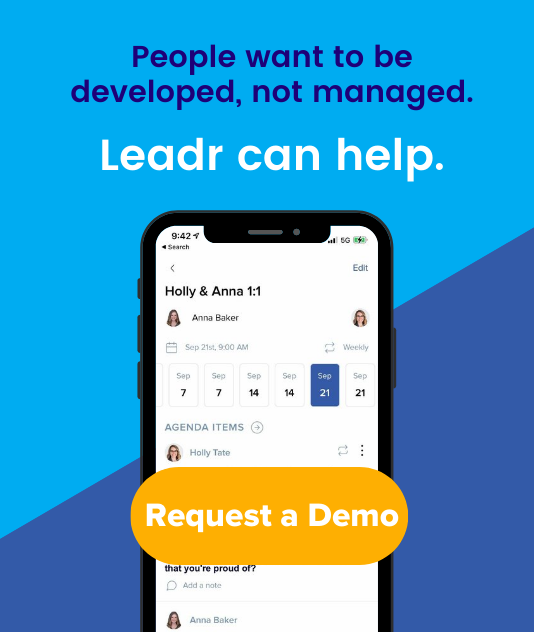Empathy: The Number One Skill For Leaders
In a world where efficiency is prized above all else, it can be easy to lose sight of the importance of empathy. However, as a leader, it is essential that you’re able to put yourself in your employees' shoes and understand their perspective. Without empathy, leaders can't hope to create an environment where their team members feel valued and supported. In this blog post, we'll discuss what empathy is, why it's so important for leaders, and how you can develop your own empathy skills.
To determine if empathy influences a manager’s job performance, we analyzed data from 6,731 managers in 38 countries. We found that managers who were rated as empathetic by their team were also rated as high performing by their own boss. - Center for Creative Leadership
In fact, 90% of employees believe empathy is important in the workplace, and 80% are willing to leave an employer who isn’t empathetic. Additionally, 76% of employees believe an organization’s empathy drives productivity. -Business Solver Annual Empathy Report
According to Wikipedia, empathy is “the capacity to understand or feel what another person is experiencing from within their frame of reference, that is, the capacity to place oneself in another's position.”
So, how can you be a more empathetic leader? Well, we’ve broken it down into three steps that, with some intentionality, are reasonably easy to put into practice.
Step 1: Be Fully Present
Mindfulness is the superpower of empathy. It's critical for developing your capacity for emotional intelligence, and a great first step. Find a way to become fully present. For instance, take a couple of deep breaths to center yourself fully in the moment. Breath is the gateway to the present moment.
Another way of becoming fully present is to literally practice mindful listening. As you engage in conversation, empty your mind of the busy thoughts (like your grocery list or what you have to do later). Focus clearly on the things your employee is saying and observe the way they’re talking about it. Notice when their breathing gets shallow or notice when they express sounds of frustration, anger, or joy.
Observe the body language that goes along with their words. In a recent conversation, I said to my colleague, "You sighed three times when you told me that story. What's that about for you?" It's really important to note that I said this with a soft curiosity and not judgment. My colleague was surprised and honored. It quickly built trust between the two of us and we went deeper into the conversation as he shared the current stresses he was experiencing.
Part of practicing empathy and learning to be fully present is to also do this for yourself, as well. My mentor, 20 years ago, was Ron Short. He was the author of the book Learning in Relationship. He talked often about the gift of being fully present in our own thoughts, our own wants and our own feelings. When you have that level of mindfulness with yourself, you have the power of choice to respond in each moment. The more you do this for yourself, the better you become at noticing it in others.
Step 2: Suspend Judgement
It’s difficult to truly understand someone else's life experience and walk around in their shoes if our life experiences, values and beliefs are different. When standing in a place of empathy, it's important to suspend judgment. Listen with a deep curiosity for their feelings, their experience, their values, and their beliefs.
Every single person brings a unique set of values, beliefs, and experiences to each situation. These unique perspectives influence our worldview, our biases and opinions, how we experience things, and our attitude moving forward. Having the capacity to honor someone's experiences is simply beautiful.
Think of a recent conversation you had with someone where you were courageously sharing your experiences, thoughts, and feelings, and it very quickly turned to their opinions about what you should do. This isn’t empathy and it's certainly not the practice of suspending judgment. It’s a difficult practice but an important one. If you find it difficult to do, be as authentic as possible and say something like, "I'm realizing we had very different views on this. Tell me more about what led you to this conclusion."
The practice of suspending judgment isn’t about putting yourself aside completely. It's about practicing active listening and understanding the other person's perspective before engaging in open dialogue.
Step 3: Cultivate Curiosity
Social psychology and sociology have revealed to us in the research that the capacity to learn continues even as we age. The neural plasticity of the brain enables us to cultivate new habits and skills well into our golden years. It’s curiosity that provides us with the motivation to engage our capacity to learn. When we direct that capacity toward others, we’re engaging in the art of curiosity, a critical element in practicing empathy. Learn to cultivate curiosity so it becomes a habit you unconsciously lean on. Dr. Martin Seligman, father of positive psychology, says that cultivating curiosity is critical for happiness and well-being.
Practicing curiosity to engage our empathy is not about being a vigilant examiner, firing questions that almost back someone into a corner or overwhelms them. It’s about having that deep sense of wonder and awe that’s almost childlike. People with empathy lean on curiosity to explore the other person's beliefs and ideas. They're curious about the inner workings of someone's mind and heart. As my mentor, Judith Glaser (world-renowned neuroscientist and author of Conversational Intelligence) used to say, "ask questions for which you have no answer". When your questions are open-ended and encourage storytelling, it creates trust and connection between you and your storyteller. That is empathy – and that is profoundly human!
Do you find yourself to be an empathetic leader? What struggles do you have when it comes to leading with empathy? Let us know in the comments below.
Share this
You May Also Like
These Related Stories

Three Simple Strategies to Raising Up New Leaders On Your Team

Did You Know That Anyone Can Be A Leader? That's A Good Thing and Here's Why.






No Comments Yet
Let us know what you think